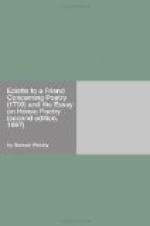For a few years in the early eighteenth century Wesley found himself in the vortex of controversy. Brought up in the dissenting tradition, he had swerved into conformity at some point during the 1680’s, possibly under the influence of Tillotson, whom he greatly admired (cf. Epistle to a Friend, pp. 5-6). In 1702 there appeared his Letter from a Country Divine to his friend in London concerning the education of dissenters in their private academies, apparently written about 1693. This attack upon dissenting academies was published at an unfortunate time, when the public mind was inflamed by the intolerance of overzealous churchmen. Wesley was furiously answered; he replied in A Defence of a Letter (1704), and again in A Reply to Mr. Palmer’s Vindication (1707). It is scarcely to Wesley’s credit that in this quarrel he stood shoulder to shoulder with that most hot-headed of all contemporary bigots, Henry Sacheverell. His prominence in the controversy earned him the ironic compliments of Defoe, who recalled that our “Mighty Champion of this very High-Church Cause” had once written a poem to satirize frenzied Tories (Review, II, no. 87, Sept. 22, 1705). About a week later Defoe, having got wind of a collection being taken up for Wesley—who in consequence of a series of misfortunes was badly in debt—intimated that High-Church pamphleteering had turned out very profitably for both Lesley and Wesley (Oct. 2, 1705). But in such snarling and bickering Wesley was out of his element, and he seems to have avoided future quarrels.
His literary criticism is small in bulk. But though it is neither brilliant nor well written (Wesley apparently composed at a break-neck clip), it is not without interest. Pope observed in 1730 that he was a “learned” man (letter to Swift, in Works, ed. Elwin-Courthope, VII, 184). The observation was correct, but it should be added that Wesley matured at the end of an age famous for its great learning, an age whose most distinguished poet was so much the scholar that he appeared more the pedant than the gentleman to critics of the succeeding era; Wesley was not singular for erudition among his seventeenth-century contemporaries.




